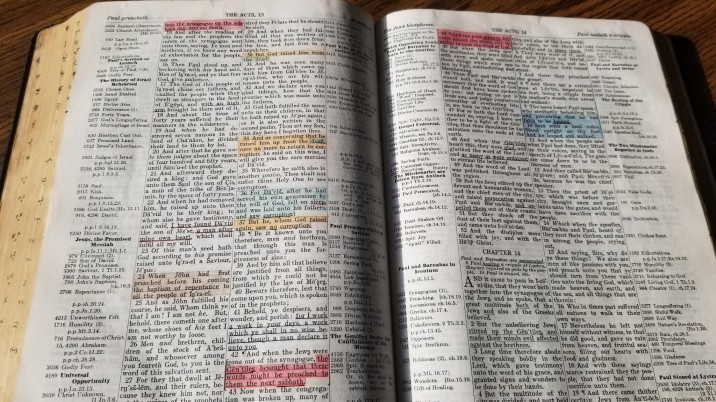God’s Law vs. The Law of Moses
From The Beginning

There is a lot of talk both within and without the COG groups about keeping the “law of Moses.” Those against it say it’s part of the old covenant and since we’re under the new covenant, we no longer have to keep those laws. And, sadly, in some ways, the COG groups don’t keep them in the way they are laid out in scripture.
Let’s establish a baseline.
What is God’s Law?
God’s law consists of the eternal laws before creation and the laws that were established at creation.
What is the Law of Moses?
It consists of the same eternal laws of God and those established at creation, and the addition of the Levitical priesthood and animal sacrifices and offerings for sin.
Bottom Line?
The law of Moses differs from God’s law in just one way: human priests and animal sacrifices and offerings for sin. (I do realize there were other sacrificial offerings, but they are not germane to this discussion.)
Which Law Remains With the Life, Death, and Resurrection of Jesus?
When Jesus came, died, and was resurrected, the human priesthood was abolished, and the animal sacrifices and offerings for sin were abolished. Why? Jesus became our High Priest in the order of Melchizedek, and He was sacrificed for all of humanity’s sins.
The human priesthood and the animal sin offerings and sacrifices pointed to Jesus becoming both. The book of Hebrews tells us they were a shadow (symbol) that pointed to Jesus Christ.
The rest of God’s law remains intact (Mt. 5:17-19)!
What Is the Issue With God’s Law?
The main sticking point seems to be with observance of the seventh-day Sabbath. But the seventh-day Sabbath predates the law of Moses. It was established as part of the creation (Gen. 2:2-3).
Jesus observed the Sabbath. Why did Jesus observe it? He created it as Lord of the Sabbath in Gen. 2:2-3! When Jesus says to “Follow me,” what does He mean? It’s pretty simple. Do what He did, speak like He spoke, treat people the way He treated them, have the same relationship with His Father that He did, think like He thought.
What Did the New Covenant Abolish?
It’s important to understand what distinguishes God’s law from the law of Moses to understand what the new covenant did and, more importantly, did not abolish. The book of Hebrews makes this abundantly clear.
How did Noah know which animals were clean and unclean (Gen. 7:2-9)? We don’t see him scratching his head and asking God to spell them out. Noah didn’t have to. This was one of God’s laws established at creation, just as the Sabbath was established as part of God’s law at creation.
Why Does the Law of Moses Exist?
Context is the key to everything. When we pull scripture out of context, we will always be wrong.
Jacob (Israel) and his family went to Egypt during a severe famine. His descendants stayed there for a total of 430 years (Ex. 12:40-41). God’s law was not passed down through successive generations (Deut. 6:9 addresses this problem).
The Israelites assimilated the Egyptian culture, which included eating unclean foods, worshipping pagan gods, and setting up idols as objects of worship. By the time Israel left Egypt, God’s law was unknown to them.
The law of Moses is God’s law given to Israel at Mt. Sinai because they’d lost it while they were in Egypt.
What Is the Takeaway for You and Me?
God’s law is God’s law. We can do all kinds of mental gymnastics to try to get around it, to refute it, and to ignore it. But none of those things change the fact that it exists and is in effect.
It still will be when Jesus establishes God’s kingdom on earth (Zech. 14:16-19).
Are we keeping God’s law as He commanded? You have to answer for you, and I have to answer for me.
I know when I look into the mirror of truth, the Word of God (Jn. 17:17), I find that sometimes the traditions of men have superseded the instructions of God, and I need to change.
What will you find?
God’s Law vs. The Law of Moses


 All references to the Sabbath in this Bible are marked in red — like a stop sign, to signify the Sabbath rest. If people would just read the red, then wouldn't they have to believe that the early New Testament Church kept the Sabbath — and admit it should be observed today?
All references to the Sabbath in this Bible are marked in red — like a stop sign, to signify the Sabbath rest. If people would just read the red, then wouldn't they have to believe that the early New Testament Church kept the Sabbath — and admit it should be observed today?